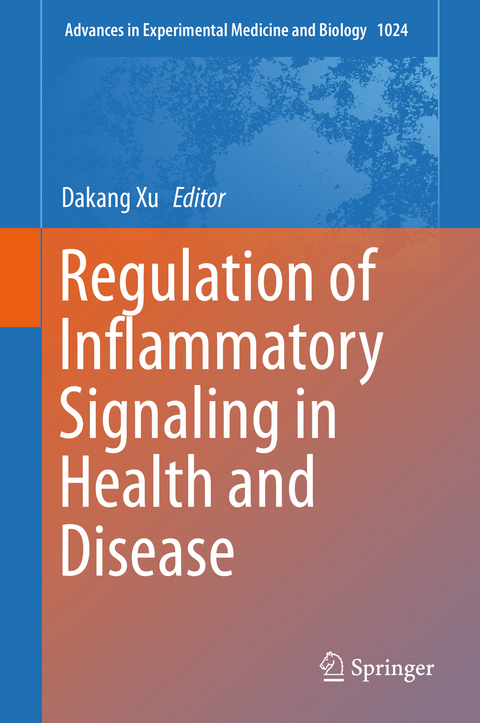
Regulation of Inflammatory Signaling in Health and Disease
Springer Verlag, Singapore
978-981-10-5986-5 (ISBN)
The book reviews novel aspects of functional genomics, epigenomics, transcriptomics, post-translat
ional modifications, microbiome and immunometabolism in order to understand inflammatory signaling and responses, covering recent findings on the mechanisms underlying the regulation of inflammatory responses to pathogens, dysregulation of these responses in inflammatory disease, and the use of such mechanisms to boost or subdue the inflammatory response. Bridging the gaps in understanding between the fields of human and mouse immunology, it provides valuable insights into inflammatory-mediated disease and immune defense. Such innovative perspectives in both basic and clinical research promote the translation of knowledge to the clinic.
Dr. Dakang Xu is Professor at Shanghai Jiao Tong University and Institute of Ageing Research, Hangzhou Normal University, China. The main focus of his research team is to used a combination of genetically modified mouse models of disease, cell signalling, bioinformatics analyses and clinical applications, to understand the mechanisms of regulation of epigenetic factors in inflammatory signalling. He has also studied how modulation of the activity ofthose key factors affects the inflammatory response and tumour progression, through the function of immune cell subsets and cytokines in cancer and inflammatory diseases. This work has led to 50 peer-reviewed publications in high impact journals, including Nature Immunology, Immunity, Nature Communications, PNAS and Cancer Research.
Activation of the innate immune receptors: guardians of the micro galaxy.- Post-translational modification control of inflammatory signaling.- Emerging roles for epigenetic programming in the control of inflammatory signaling integration in heath and disease.- Roles of HDACs in the Responses of Innate Immune Cells and as Targets in Inflammatory Diseases.- Inflammasomes in the Gut Mucosal Homeostasis.- Microbial factors in inflammatory diseases and cancers.- cGAS-STING activation in the tumor microenvironment and its role in cancer immunity.- TLR Agonists as Adjuvants for Cancer Vaccines.- Telomere damage response and low-grade inflammation.- The development and diversity of ILCs,NK cells and their relevance in health and diseases
| Erscheinungsdatum | 14.10.2017 |
|---|---|
| Reihe/Serie | Advances in Experimental Medicine and Biology ; 1024 |
| Zusatzinfo | 18 Illustrations, color; 1 Illustrations, black and white; XII, 244 p. 19 illus., 18 illus. in color. |
| Verlagsort | Singapore |
| Sprache | englisch |
| Maße | 155 x 235 mm |
| Themenwelt | Studium ► Querschnittsbereiche ► Infektiologie / Immunologie |
| Naturwissenschaften ► Biologie ► Biochemie | |
| Naturwissenschaften ► Biologie ► Zellbiologie | |
| Schlagworte | Epigenetics regulation • Immunometabolism • inflammasomes • Inflammatory signaling and disease • microbiome • Post-translational modification |
| ISBN-10 | 981-10-5986-1 / 9811059861 |
| ISBN-13 | 978-981-10-5986-5 / 9789811059865 |
| Zustand | Neuware |
| Informationen gemäß Produktsicherheitsverordnung (GPSR) | |
| Haben Sie eine Frage zum Produkt? |
aus dem Bereich


